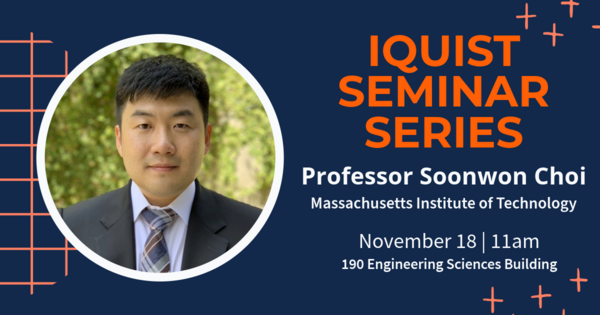
IQUIST Seminar: "Quantum Computing Enhanced Sensing," Soonwon Choi, Assistant Professor of Physics, Massachusetts Institute of Technology
- Event Type
- Seminar/Symposium
- Sponsor
- IQUIST
- Location
- 190 Engineering Sciences Building, 1101 W Springfield Ave, Urbana, IL 61801
- Date
- Nov 18, 2025 11:00 - 11:50 am
- Speaker
- Soonwon Choi, Assistant Professor of Physics, Massachusetts Institute of Technology
- Contact
- Stephanie Gilmore
- stephg1@illinois.edu
- Phone
- 217-244-9570
- Views
- 199
- Originating Calendar
- IQUIST Seminar Series
Abstract: Quantum computing and sensing represent two distinct frontiers of quantum information science. Here, we harness quantum computing to solve a fundamental and practically important sensing problem: the detection of weak oscillating fields with unknown strength and frequency. We present a quantum computing enhanced sensing protocol, that we dub quantum search sensing, outperforming all existing approaches. Furthermore, we prove our approach is optimal by establishing the Grover-Heisenberg limit -- a fundamental lower bound on the minimum sensing time. The key idea is to robustly digitize the continuous, analog signal into a discrete operation, which is then integrated into a quantumalgorithm. Our metrological gain originates from quantum computation, distinguishing our protocol from conventional sensing approaches. Indeed, we prove that broad classes of protocols based on quantum Fisher information, finite-lifetime quantum memory, or classical signal processing are strictly less powerful. We propose and analyze a proof-of-principle experiment using nitrogen-vacancy centers, where meaningful improvements are achievable using current technology. This work establishes quantum computation as a powerful new resource for advancing sensing capabilities.
Bio: Soonwon Choi is a Victor F. Weisskopf Career Development Assistant Professor of Physics at MIT, whose research is focused on quantum information science and technology and its applications for studying out-of-equilibrium dynamics of quantum many-body systems. Choi completed his undergraduate study in physics at Caltech in 2012, got his PhD degree in physics from Harvard University in 2018. Then he worked as a Miller Postdoctoral Fellow at UC Berkeley before joining MIT as an assistant professor in July 2021.
To watch online, go to the IQUIST YouTube channel: https://www.youtube.com/channel/UCCzAySwQXF8J4kRolUzg2ww